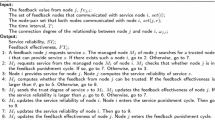Abstract
Trust in social learning environment is influenced greatly by rapid-changing social elements. Therefore it is necessary for us to improve the KeyNote trust model to adapt the dynamic user behavior in social learning. In this paper, we mainly devote ourselves to the work of building a dynamic trust model based on indirect trust relationship. We take advantage of KeyNote to build the dynamic trust model, in which we use an indirect trust algorithm to calculate the trust value of indirect trust relationship. In this way, we can get the trust values of entities in the social learning network by indirect link. Finally our experimental results prove that this dynamic trust management model can deal with the dynamically changing relationship, and calculate user trust value by monitoring user behavior to realize the function of dynamically managing user access.
Access this chapter
Tax calculation will be finalised at checkout
Purchases are for personal use only
Similar content being viewed by others
References
Wang, T., Krim, H., Viniotis, Y.: A generalized Markov graph model: application to social network analysis. IEEE J. Sel. Top. Sig. Proces. 7, 318–332 (2013)
Blaze, M., Ioannidis, J., Keromytis, A.: Trust management for IPSec. In: Proceedings of the Internet Society Symposium on Network and Distributed System (SNDSS 2001), vol. 5, pp. 139–151 (2001)
Blaze, M., Ioannidis, J., Keromytis, A.D.: Offline micropayments without trusted hardware. In: Syverson, P. (ed.) FC 2001. LNCS, vol. 2339, pp. 21–40. Springer, Heidelberg (2002)
Samarati, P., Reiter, M.X., Jajodia, S.: An authorization model for a public key management service. ACM Trans. Inf. Syst. Secur. 4, 453–482 (2001)
Li, W., Shang, Y., Ji, Y.: Analysis of multiple objective decision methods based on entropy weight. Comput. Intell. Industr. Appl. 1, 953–956 (2008)
Guha, R., Kumar, R., Raghavan, P.: Propagation of trust and distrust. In: WWW 2004, pp. 403–412 (2004)
de Mello, E.R., van Moorsel, A., da Silva Fraga, J.: Evaluation of P2P search algorithms for discovering trust paths. In: Wolter, K. (ed.) EPEW 2007. LNCS, vol. 4748, pp. 112–124. Springer, Heidelberg (2007)
Li, M., Bonti, A.: T-OSN: a trust evaluation model in online social networks. In: 2011 IFIP 9th International Conference on Embedded and Ubiquitous Computing, pp. 469–473 (2011)
Chen, I.-R., Bao, F., Chang, M., Cho, J.-H.: Dynamic trust management for delay tolerant networks and its application to secure routing. IEEE Trans. Parallel Distrib. Syst. 99, 1 (2013)
Blaze, M., Kannan, S., Lee, I., Sokolsky, O., Smith, J.M., Keromytis, A.D., Lee, W.: Dynamic trust management. Computer 42, 44–52 (2009)
Meng, L., Xu, R., Li, X., Xu, G.: The improvements of KeyNote trust management system. Adv. Inst. Convergence Inform. Technol. 6, 177–185 (2012)
Blaze, M., Ioannidis, J., Keromytis, A.D.: Experience with the KeyNote trust management system: applications and future directions. In: Nixon, P., Terzis, S. (eds.) iTrust 2003. LNCS, vol. 2692, pp. 284–300. Springer, Heidelberg (2003)
Acknowledgment
This work is partly supported by National Program on Key Basic Research Project (973 Program) under Grant 2013CB329304, National Natural Science Foundation of China (No. 61003080), and the Opening Project of Shanghai Key Laboratory of Integrate Administration Technologies for Information Security (No. AGK2012007).
Author information
Authors and Affiliations
Corresponding author
Editor information
Editors and Affiliations
Rights and permissions
Copyright information
© 2015 Springer-Verlag Berlin Heidelberg
About this paper
Cite this paper
Xu, R., Xu, G., Sun, D., Li, X., Feng, Z. (2015). Improving KeyNote Trust Management Model Based on User Behavior for Social Learning. In: Chiu, D., et al. Advances in Web-Based Learning – ICWL 2013 Workshops. ICWL 2013. Lecture Notes in Computer Science(), vol 8390. Springer, Berlin, Heidelberg. https://doi.org/10.1007/978-3-662-46315-4_10
Download citation
DOI: https://doi.org/10.1007/978-3-662-46315-4_10
Published:
Publisher Name: Springer, Berlin, Heidelberg
Print ISBN: 978-3-662-46314-7
Online ISBN: 978-3-662-46315-4
eBook Packages: Computer ScienceComputer Science (R0)




